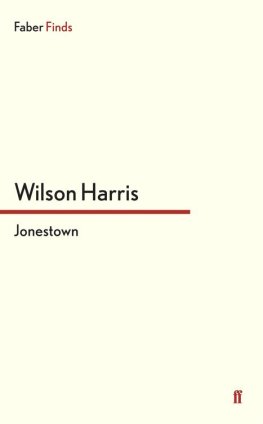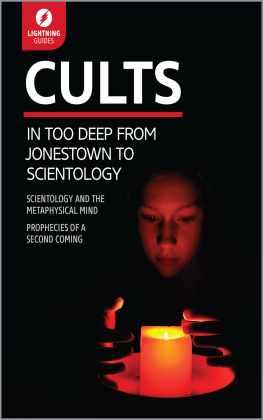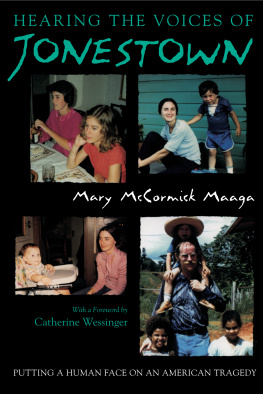Originally published in 1987 by Transaction Publishers
Published 2017 by Routledge
2 Park Square, Milton Park, Abingdon, Oxon OX14 4RN
711 Third Avenue, New York, NY 10017, USA
Routledge is an imprint of the Taylor & Francis Group, an informa business
Copyright 2004 by Taylor & Francis.
All rights reserved. No part of this book may be reprinted or reproduced or utilised in any form or by any electronic, mechanical, or other means, now known or hereafter invented, including photocopying and recording, or in any information storage or retrieval system, without permission in writing from the publishers.
Notice:
Product or corporate names may be trademarks or registered trademarks, and are used only for identification and explanation without intent to infringe.
Library of Congress Catalog Number: 2003063358
Library of Congress Cataloging-in-Publication Data
Hall, John R.
Gone from the promised land : Jonestown in American cultural history / John R. Hall; with a new introduction by the author.
p. cm.
Includes bibliographical references and index.
ISBN 978-0-7658-0587-4 (alk. paper)
1. Peoples Temple. 2. Jonestown Mass Suicide, Jonestown, Guyana, 1978. I. Title.
BP605.P46H35 2004
289.9dc22 2003063358
ISBN-13: 978-0-7658-0587-4 (pbk)
And all the children of Israel murmured against Moses and against Aron; and the whole congregation said unto them, Would God that we had died in the land of Egypt! or Would God we had died in this wilderness!
And wherefore hath the Lord brought us unto this land, to fall by the sword, that our wives and our children should be a prey? Were it not better for us to return unto Egypt?
And they spake unto all the company of the children of Israel, saying, The land, which we passed through to search it, is an exceeding good land.
If the Lord delight in us, then he will bring us into this land, and give it to us; a land which floweth with milk and honey.
Numbers 14: 2-3, 7-8
To commemorate an irredeemable tragedy twenty-five years on is a difficult thing. Especially those closest to Peoples Templeeither as participants or opponents, or bothhave struggled to come to terms with the murders and mass suicide at Jonestown. And gradu-ally, people once estranged by what happened have reached out toward one another. But the tremendous loss can never be erased.
Most other people live with more distance from the murders and mass suicide at Jonestown, either because they only experienced the events at the time through the lenses of the mass media, because they were too young to understandas if understanding had been a possibility, or because they were not yet born. For most people, then, Jonestown is doubly remote. Despite all the efforts to pin down what happened, how and why, it always has been an enigma. Now it is a faded enigma, even more hazy in the mists of time passed, pushed away on the sea of memory by the rising tides of more recent events.
Those who would understand the past have two basic choices. We can either try to make sense of the world as it was understood by the people caught up in the events at the timeand perhaps try to explain how events happened in part as a product of those peoples actions. Or, we can try to make sense of events from the perspective of our time, in relation to the larger course of history. Much has been learned by taking the first tack. We know that Jim Jones was a deeply flawed yet somehow visionary man whose movement attracted to Peoples Temple many decent and deeply committed people. And we know that the murders and mass suicide cannot be adequately explained by either madness in Jim Jones or evil that arose within him. In Gone from the Promised Land I elaborated an alternative thesis; later I subjected it to counterfactual analysis in Apocalypse Observed. Although the internal dynamics in Peoples Temple and Jim Jones are not to be discounted, the murders and mass suicide, I have argued, were the product of an ever escalating struggle between the leadership of Peoples Temple and their opponents, the Concerned Relatives. Questions of detail about what happened re-main unresolved, but absent dramatic revelations by participants including agencies of the U.S. governmentthey are likely to re-main unresolved. I, for one, would be surprised if new information radically alters explanations of what happened at Jonestown.
Yet as scholars now acknowledge, it is not only facts that weave the fabric of history. Facts are embedded in stories that make sense of them. Twenty-five years out, we now have a very different perspective on the wider history of the era of Peoples Temple. More-over, we live in a very different world. Yet it is one that resonates obliquely with the apocalypse at Jonestown. What, then, can be learned by looking at Peoples Temple in its times, as we now see those times? And what can be learned about our times by reflecting on Jonestown?
The entire history of Peoples Temple as a social movementfrom the 1950s to the 1980stook place during the period of the Cold War. Communism seemed a serious threat both to the capitalist establishment in the West and to political defenders of American freedom. A new postindustrial societydriven by production of knowledgewas emerging, and the middling classes were beginning to follow the well-to-do in putting leisure and consumption rather than work and production at the center of their lives. Socio-economic class remained the central organizing axis of society, and non-whites were concentrated in the lower classes.
Jim Jones was a child of the old Left who crossed the divide of World War II and the onset of the Cold War. In the 1950s he established Peoples Temple as a religious organization in Indiana in part by challenging racial segregation, and in its move to California in the 1960s, the Temple participated in the tides of social change of the decadethe civil-rights movement, the anti-Vietnam war movement, and the New Left. I may have missed a distinctly feminist discourse within Peoples Temple, if it was there, but certainly the group seems to have cultivated the talents and abilities of its members, whoever they were. The 1960s were also the era of the counterculture, and although Peoples Temple was not strictly speaking a Flower-Power kind of organization, if memory serves, it was listed in a directory of communal organizations, and certainly it attracted people conversant in the milieu of the counterculture. During the 1970s Peoples Temple indeed became an increasingly communal organization. In fact, it was one of the larger ones, akin to The Farm in Tennessee and the later Rajneeshpuram colony in Oregon. In short, as Peoples Temple grew and developed, the group channeled a distinctive confluence of its historical momentof Left politics aligned with interracial communalism, wrapped within an organization that was unusual in its capacity to infuse countercultural discourse with a radicalized religiosity.









